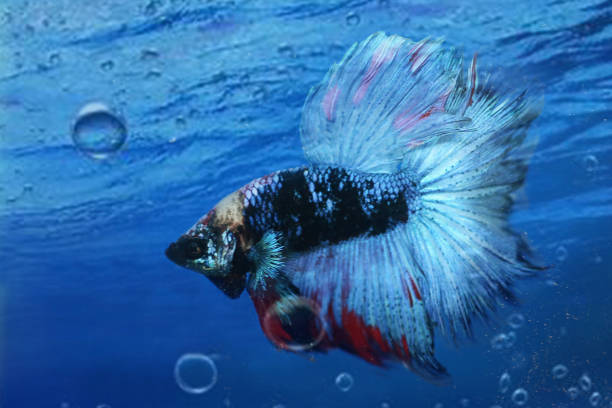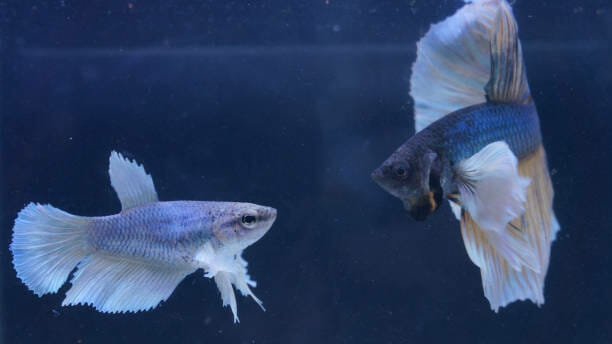Spring Water for Betta Fish: Recommendation and Water Requirements
Betta fish are tropical fish that are known for their brightly colored fins and scales. Bettas can be kept in a variety of water temperatures, but they do best in warm water. If your home’s temperature falls below 68 degrees Fahrenheit, you should bring your betta fish into a warmer environment.
You can use spring water for betta fish. However, it is important to note that their water requirements may be different from those of other fish species. For example, a betta fish’s diet consists largely of aquatic invertebrates so they will require more nitrogenous nutrients in their water than a goldfish or koi do. Therefore, if you are using tap water as your source of freshwater for your betta fish, be sure to check the water’s pH level and make adjustments as needed.

Table of Contents
Is Spring Water Safe for Betta Fish?
Yes, spring water is safe for betta fish. However, as with any new water source for your pet, it’s important to check the pH level and make any necessary adjustments before adding it to their tank. Some people believe that the high levels of calcium and magnesium in spring water can be harmful to fish, while others think that the chlorine in municipal water supplies can be detrimental to fish. In general, it is best to consult with a qualified fish keeper before introducing any new element into your aquarium, including spring water.
Recommended Water Parameters
There are many factors to consider when choosing the right water parameters for your betta fish. The following are some general recommendations, but always consult your local fish store or aquarium specialist for specific advice on water quality for your specific species of fish. The temperature that Bettas prefer is a warm temperature of 75-80 degrees Fahrenheit (23.8-26.6 degrees Celsius). Bettas prefer a pH level between 6.8 and 8, although they can tolerate a slightly higher or lower pH level in their water if it is consistently maintained.

Betta Fish Water Conditions & Filtration
Betta fish require clean, fresh water to survive, so it is important to keep their tanks clean and filled with quality spring water or filtered tap water. In addition to providing the necessary conditions for healthy growth, proper filtration can help control unwanted bacteria and parasites in your fish’s environment.
Things to Remember Before Adding Bettas to Water
Before adding any fish to their new home, be sure to do your research and follow some basic guidelines. Bettas prefer warm water temperatures so make sure the tank you choose has a heater built-in if you are located in an area with a colder climate. Additionally, make sure the water is clean and free of debris. Bettas are susceptible to respiratory issues if they breathe in dirt or other pollutants. Finally, provide plenty of food and fresh water and monitor your betta’s water quality regularly.
Changing Your Betta Fish’s Water
When it comes to keeping your betta fish healthy, changing their water regularly is a must. Bettas are obligate carnivores and require a high-quality diet that includes freshwater. If your betta’s water isn’t clean and fresh, it will not be able to thrive. To change your betta fish’s water first remove any debris or excess plant material from the bottom of the tank, fill the tank with room temperature water, and add 1 tsp of aquarium salt per 5 gallons of water (this will help to maintain a healthy balance of minerals in the tank then place your betta fish into the tank and wait 10 minutes for them to adjust before adding freshwater, lastly, repeat the cycle at least once a week depending on your tank size and how much water you are adding each time.
When Should You Change a Betta’s Water?
The best way to care for your betta fish is to change their water once every week. If your betta fish is swimming in a large container with plenty of room to move, you can change their water more often. If your betta fish is kept in a small tank, changing their water every 7 to 10 days will be sufficient.
Can You Use Bottled Water for Betta Fish?
There has been a lot of debate lately about whether or not you can use bottled water for betta fish. The general consensus seems to be that tap water is just as good, if not better, for the fish. However, there are a few reasons why bottled water might be better for some betta owners. First of all, tap water can often contain high levels of chlorine which can be harmful to your betta fish. Bottled water doesn’t typically contain chlorine and many brands also have filters that remove other harmful chemicals and minerals from the water. Secondly, tap water can sometimes be hard to clean and may contain bacteria and other contaminants that could make your betta sick. Bottled water is usually easier to clean and the water is often less acidic which means it isn’t as damaging to your betta’s delicate skin. Finally, tap water can often be freezing cold. This might be a concern for some people who live in colder climates.
Can You Use Well Water for Betta Fish?
There are many factors to consider when choosing a water source for your betta fish, but one of the most important is the quality of the water. If your well water is high in contaminants, it’s not going to be a good choice for your fish. Spring or rainwater are both excellent choices for betta fish, as they are both low in contaminants and provide plenty of oxygen and nutrients for your fish.
Do Betta Fish Need Special Water?
There is no one-size-fits-all answer to this question, as the needs of your individual betta fish will vary depending on their size, age, and health. However, all betta fish should have access to clean water that is soft and acidic. They also need plenty of oxygenated water in order to live healthy lives. Some people recommend filling a large bowl or tank with fresh, low-chlorine water so that you can watch your betta fish swim around while they soak up some healthy oxygen.